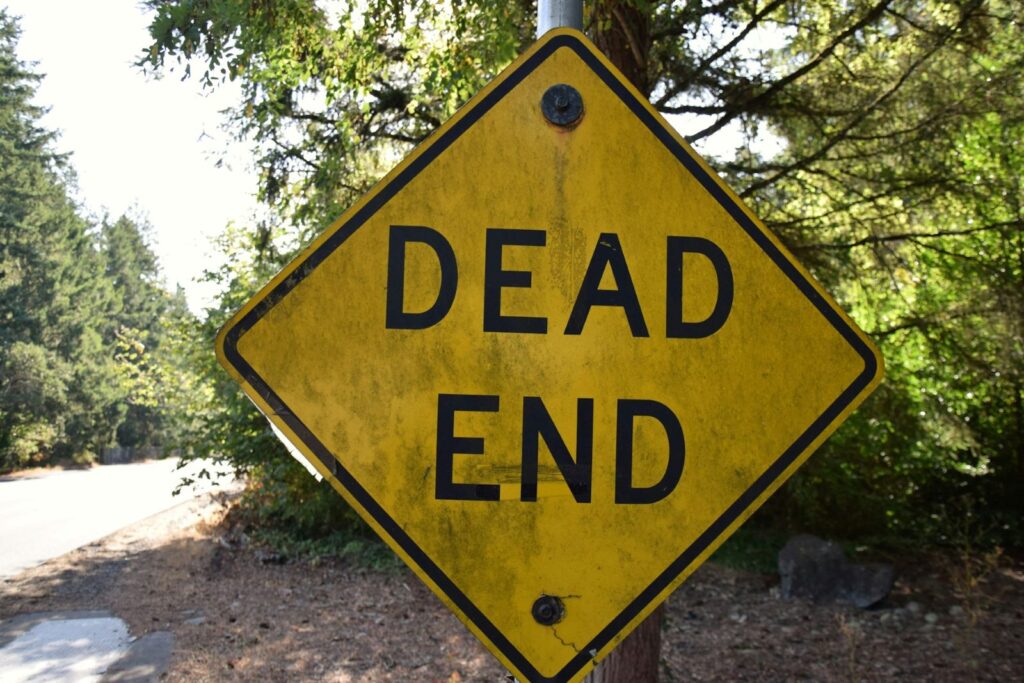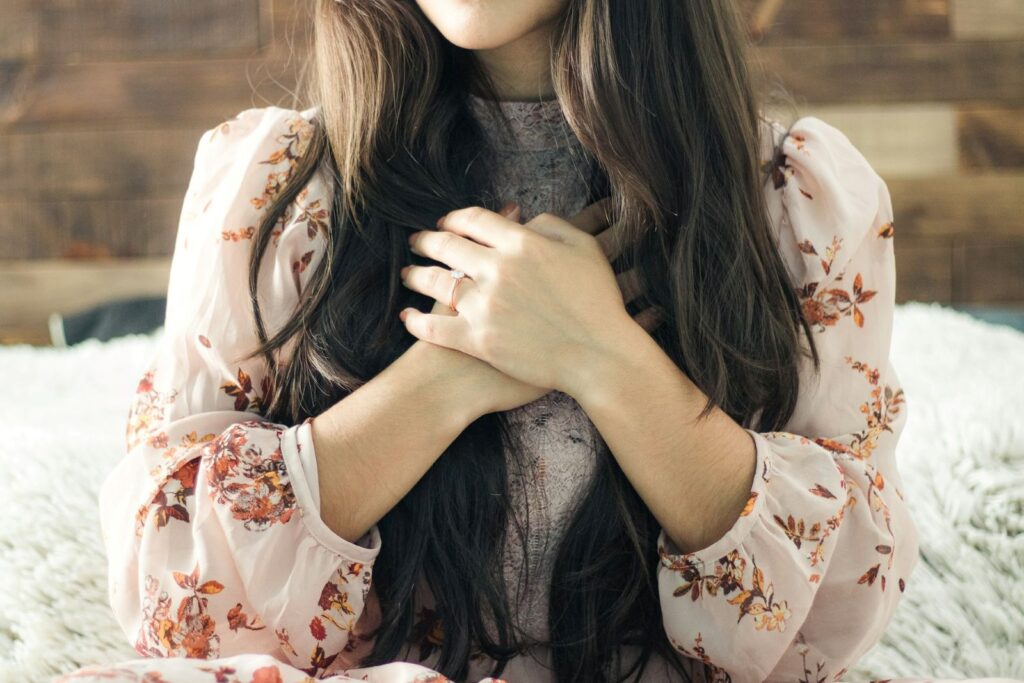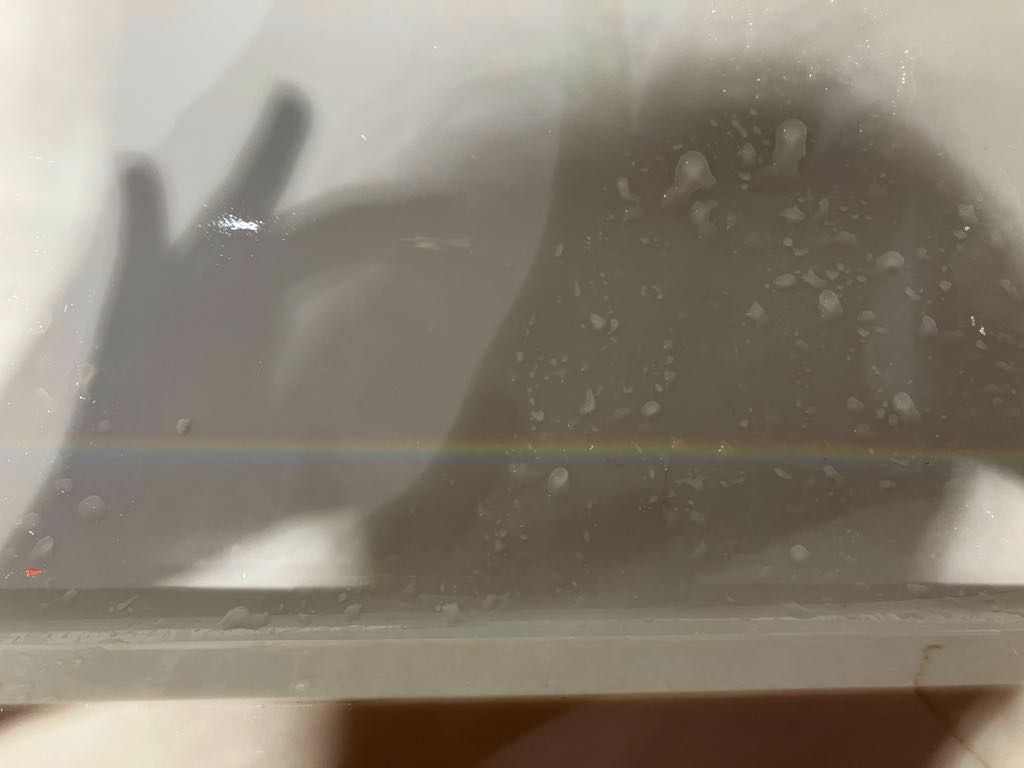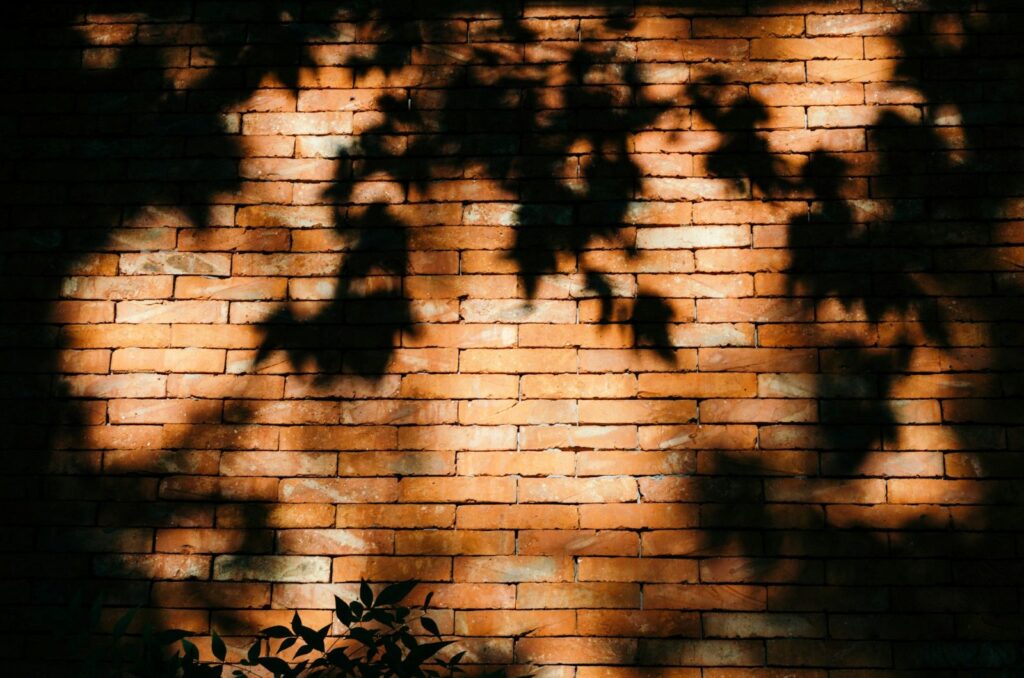I watched a retelling of Cinderella that absolutely gutted me because it was so sad, so unjust. I’m not going to link to it because I’m about to give major spoilers, but if you’d like to see it, message me. This adult version of the story was told from the perspective of one of the stepsisters, Drizilla, and in it, Cinderella was a manipulative psychopath who lied, cheated, and stole. The story ends with Drizella in a sanatorium, not visited by a single person, while Cinderella became a princess.
So again, not a “happily ever after” kind of story. Not a “feel-good” kind of story. It was a brutal story that touched on something very important, which Drizella said near the end: “No one really wants the truth. Not when the truth is ugly, and the liar is beautiful.” Yeeees. The truth is ugly, uncomfortable. It often asks something of us. It forces us to look at something we’d rather not look at because it challenges our worldview or a belief we have about someone or ourselves. It’s much easier, in some ways, to keep living a lie.
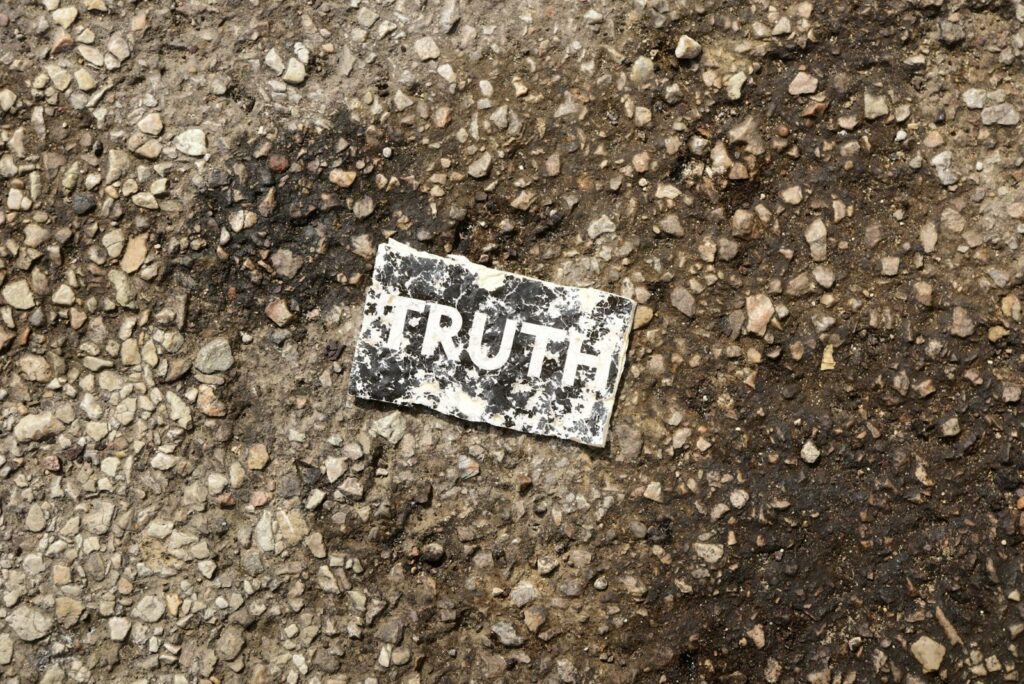
Sometimes the truth is ugly. Photo by Michael Carruth on Unsplash
I see this with politics – elected officials lie all the time. They sell a story because it sounds good. It’s much easier to say, “We’re investigating fraud in states that just happen to be Democratic-led,” rather than, “We plan to bully and terrorize people who disagree with us.” It sounds reasonable to investigate fraud, which it is, but why is the investigation selective? That’s not a baseless example, by the way. In the past few days, the Trump Administration announced it is investigating fraud in 14 blue states. But just the blue ones, not the red ones. How convenient.
But here’s the thing about truth. As Elizabeth Gilbert wrote in her latest memoir, “The truth has legs. It always stands. When everything else in the room has blown up or dissolved away, the only thing left standing will be the truth.” The way I like to think of it is you cannot escape reality. It will grab you by the collar and shake you. It will force you to look it in the face even when every part of you is trying to turn your head. You cannot escape reality any more than you can escape death.
This relates to spirituality because in Sanskrit, the unchangeable entity is Sat. The external manifestation of Sat is satya, or benevolent truthfulness. My spiritual teacher said, “Only satya or truth triumphs and not falsehood. Whenever there is a clash between truth and untruth, truth’s victory is inevitable. … Untruth, being a moving phenomenon, may attain a temporary victory on its march, but never a permanent one. … Falsehood does not win because it is relative, it is ever-changing.”
I take comfort in knowing that eventually the truth will come out. That falsehood doesn’t win because it goes against the unchangeable entity. That people can try to run away from the truth but they can’t run forever. Eventually, truth finds us all and the question becomes, what are we going to do about it?
I dream of a world where we understand a lie is often easier to swallow than the truth. A world where we recognize that even though it seems like lies are winning, their victory is only temporary. A world where we recognize we cannot escape the truth even if we try. A world where we remember the truth always comes out eventually, even when it’s ugly.
Another world is not only possible, it’s probable.
I had an interesting experience with certainty on Saturday night. I went to a Democratic Socialists of America teach-in where they discussed how veganism feeds anticapitalism and vice versa. They served dinner and I was SURE I’d be able to eat almost nothing because while I’m vegan, I don’t eat onions and garlic, which are basically in everything. It turns out they ordered food from one of a handful of restaurants that don’t cook with those ingredients!
And then on the way home, all the transit apps said my bus was on time (it wasn’t). I was certain I’d missed my connecting bus because of the delay, which, again, all of the transit apps said would be the case, but I didn’t! The connecting bus was also late, which meant I waited a grand total of 2 minutes rather than the 15 I begrudgingly anticipated. Here was the trickster working in my favor. I usually think of the trickster as the disruptive force that makes it rain on your wedding day, but sometimes the trickster can work to your benefit.
These experiences around uncertainty reminded me of a quote a friend shared. Painter Paul Cézanne said, “We live in a rainbow of chaos.” I don’t know about you but I don’t naturally associate “rainbow” with “chaos.” I don’t think of chaos and unpredictability as beautiful. I think of them as dark, ugly, something to be avoided at all costs. But that’s not the full story, is it? As the Post-It note on my bathroom mirror says, “Remember: Life can be surprising and delightful.”
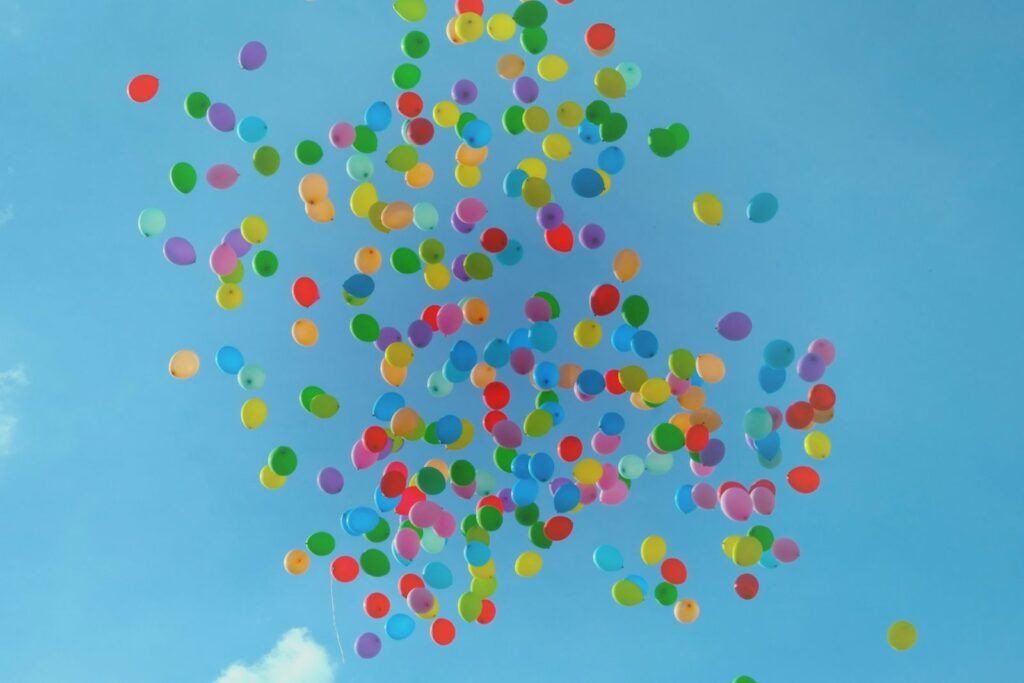
Is it a rainbow? Yes? It is chaos? Also yes. Photo by Luca Upper on Unsplash
Life can be chaotic and beautiful. Uncertain and joyful. It’s all of it. Life is a broad range of experiences and I do better when I embrace that. There’s a psychological concept that supports this called emodiversity, which means letting yourself feel an abundant range of emotions – not just the pleasant ones. A study of 37,000 people found that those who do that have better mental health, decreased depression, better physical health, and know how to handle a wide range of behavioral situations.
Diversity is the name of the game over and over again. Diversity in emotions. Diversity in the gut microbiome. Diversity in the gene pool. We are stronger with diversity. My spiritual teacher says:
“Some people say that disparity is the order of nature; therefore, there must be differences between one group and another, between rich and poor, etc. However, such a proposition is fundamentally incorrect. Instead, it is correct to say that diversity is the order of providence. One must remember that identicality is disowned by nature – nature will not support identicality. Whenever identicality occurs, a sort of structural explosion takes place and the entire structure is broken into pieces. So diversity is the law of nature and identicality can never be.”
He’s talking specifically about social structures but the concept also applies to our internal diversity, or in this case, our internal range of emotions and experiences. Life is meant to be a rainbow of chaos, and instead of becoming something to fear, I’m learning it’s something I can enjoy.
I dream of a world where we recognize the only certainty we’ll ever have is that life is uncertain. A world where we understand chaos and unpredictability don’t have to be bad things. A world where we embrace our full range of emotions and accept diversity internally and externally. A world where we remember we live in a rainbow of chaos.
Another world is not only possible, it’s probable.
I’m sick and feel unable to record the audio for this post. Also, I’m pretty sure no one wants to hear me sniffling anyway. In terms of why I’m resharing this post from August 2021, I honestly don’t know, but it’s what kept ringing through my head. Maybe someone out there really needs to hear it. Enjoy.
I keep thinking about an essay I read in the book All I Really Need to Know I Learned in Kindergarten by Robert Fulghum. He writes about how he lived at the dead end of a dead-end street, two blocks long, at the bottom of a hill in north Seattle. At the top of the hill, two big yellow and black signs declared: STREET ENDS. And at the end of the street where Fulghum resided, another big sign with stripes and reflectors stated the obvious: DEAD END.
You could see that “DEAD END” sign a long way off – in other words, the dead end didn’t sneak up on you. However, what’s so remarkable is people drove down the street anyway and seemed to be baffled when the street did, in fact, end.
Fulghum writes:
“Not just part way, mind you. Not just to where the reality of the situation cleared up. No, sir. They drove all the way down, right up to the sign, the big black one with stripes, the one that said DEAD END.
“And they read that sign two or three times. As if they were foreigners and had to translate the English. They looked on either side of the sign to see if there was a way around it. Sometimes they sat there for two or three minutes adjusting their minds …. There was no pattern. All kinds of vehicles, all kinds of people, broad daylight and pitch dark. Even a police car a couple of times. And once a fire truck.
“Innate skepticism or innate stupidity? I confess I do not know. A psychiatrist friend tells me it’s a sample of an unconscious need to deny – that everyone wants the road or The Way to continue on instead of ending. So you drive as far as you can, even when you can clearly read the sign. You want to think you are exempt, that it doesn’t apply to you. But it does.”
His last two lines especially strike me. We want to think we are exempt, that whatever we’re confronting – a dead-end street, a deadly virus, whatever – doesn’t apply to us. But it does. I’d wager the majority of us want to feel special. We want to be right, to know the truth, and even when there’s evidence demonstrating we’re wrong, we can’t accept it. Why is that? I think one reason is U.S. culture doesn’t have many examples of people saying, “I don’t know.”
Instead of saying, “I don’t know,” we make something up, we pretend to know. We try to save face versus practicing humility and admitting, “I don’t know,” or even, “Maybe I’m wrong.” Who says maybe I’m wrong these days?!? I can’t remember the last time I heard in a public space someone open to the possibility they don’t know everything. It’s as if due to the internet and having so much knowledge at our fingertips, we’re loath to say, “I don’t know” or “I could be wrong.”
Also likely wrapped up in “I don’t know” is fear. My spiritual teacher says, “Humans do not fear to tread a known path, but they always hesitate and fear to travel unknown paths.” Sometimes those unknown paths are intellectual ones. It’s far easier to cling to a thought or belief you learned early on and is corroborated by friends and family than to change your mind and believe something new. But that’s the beautiful thing about the mind – it can be changed.
There’s nothing shameful or humiliating about saying, “I don’t know,” or “I was wrong.” No human is omniscient. We aren’t supposed to know everything, and that means we’d be better off acknowledging that’s true. We’d also be better off accepting reality when it’s staring us in the face – like when we’re confronted with a dead-end street.
I dream of a world where we understand that if there’s a road sign that says “DEAD END,” the street ends. A world we understand if we think we know something other people don’t, we’re likely deluding ourselves. A world where we’re OK with some uncertainty and we embrace the power of saying, “I don’t know” and “Maybe I’m wrong.” A world where we all learn from dead-end streets.
Another world is not only possible, it’s probable.
I don’t have a good reason as to why I’m resharing this post from September 2017 – I didn’t rewatch Hamlet, for instance – but it’s what we call in the journalism world “an evergreen,” meaning it’s relevant at any time. Enjoy.
This weekend, I watched Hamlet with a friend of mine and remarked how the play touched me in a way it didn’t when I was a teenager. I’ve seen Hamlet on numerous occasions, I’ve heard the famous soliloquy a million times, and even unknowingly quoted from the play in this blog.
Hamlet is a story I’m familiar with, but watching it this weekend, I could relate to him; I understood him in a way I hadn’t before. No, my uncle did not kill my father and marry my mother, but I, too, have experienced anger, grief, and despair. As I watched Hamlet this weekend, all I could think was, “Me too.” I wouldn’t have taken the actions he took, but I empathize with his feelings in a way I didn’t before.
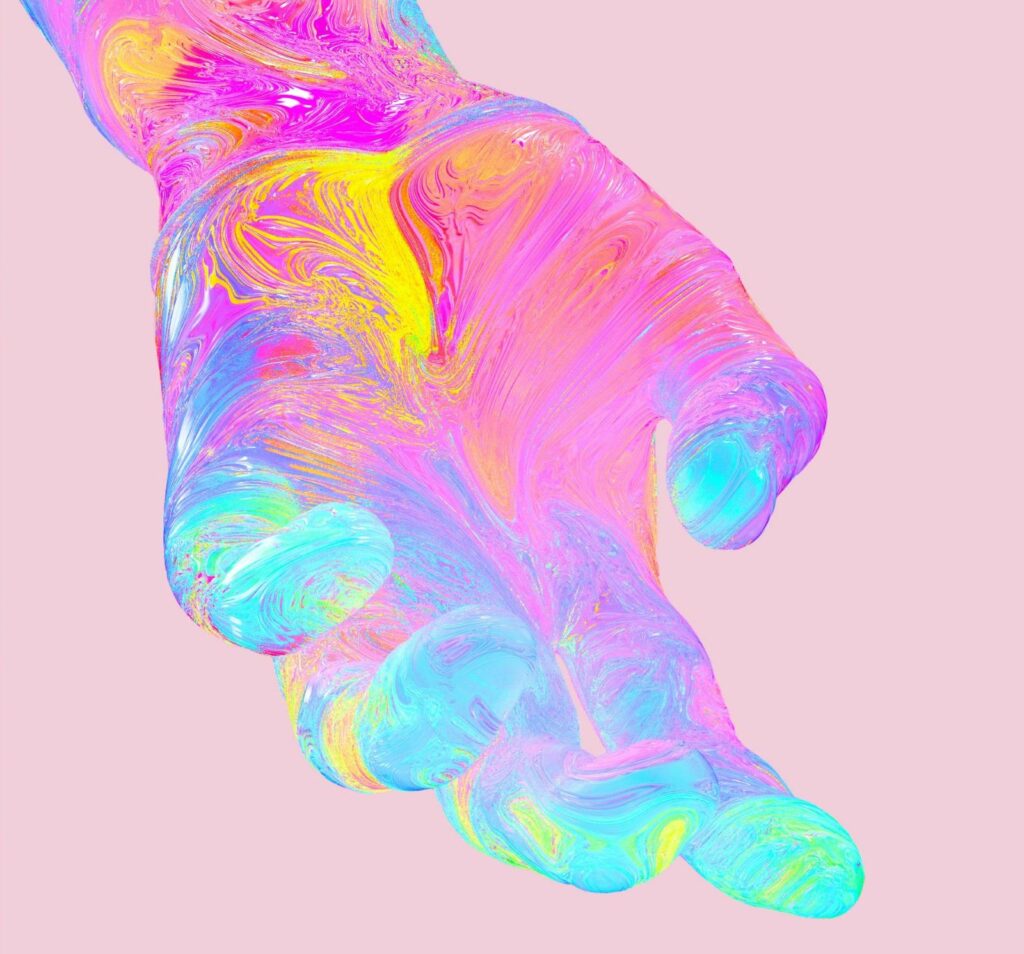
We all feel the same things. Photo by Maxim Berg on Unsplash
I’m reminded of that quote by Maya Angelou, who said, “We are all human; therefore, nothing human can be alien to us.” Yes! I’m not a scholar, but it seems to me Shakespeare’s work endures because he taps into the essence of what it means to be human, with all the pain, glory, comedy, and tragedy. One minute, Hamlet is contemplating suicide, and the next, his friends burst through the door, talking and laughing. That’s certainly how my life is. I think I mentioned it here, but literally the day after I found out my co-worker died, I unintentionally participated in a wedding held in my neighbor’s backyard. My windows were open, so the sounds of the ceremony wafted through the air. Life is tragic and comic, something Shakespeare understood and illustrated.
Even though he wrote his plays hundreds of years ago, they’re still relevant. There is no emotion anyone has ever felt that I haven’t felt too. Our experiences? Highly variable. Our emotions? The same. I bring this up because I wonder how things would be different if we all held this viewpoint. Instead of calling Mexicans rapists like a certain high-ranking official, instead of calling people aliens, what if we recognized that we are all human and thus nothing human can be alien to us?
My spiritual teacher said:
Human society comprises various races. There is no reason whatever to recognize one race as superior to another race. The external differences in constitutions among these human groups cannot alter their basic human traits – love and affection, pleasure and pain, hunger and thirst. These basic biological instincts and mental propensities equally predominate in human beings of all complexions in all countries and in all ages. A mere rustic, illiterate, half-naked tribal mother of an unknown hamlet … in India bears deep maternal affections for her young children; in the same way, a well-educated mother of a locality of New York pours out of her heart a great love for her own children.
The subterranean flow of love and affection exists in all hearts alike. Every person cries out in pain, everyone feels pleasure when there are occasions of joy and happiness. [F]undamentally, their mental existences flow along the same channels of ideas and consciousness. Containing the same cosmic momentum and under the same cosmic inspiration, they all have set out for a tryst with the same destiny.
That means we have more similarities than differences. We are all like one another. We are all human, and we’d do well to recognize that.
I dream of a world where we recognize we all have the same human emotions. A world where we remember there is nothing anyone can feel that we also haven’t felt, and vice versa. A world where we understand we aren’t so alien from each other, and in fact, humans aren’t aliens at all.
Another world is not only possible, it’s probable.
I was never a Girl Scout but you’d think I was because I’m always prepared. Not only do I have an earthquake kit, I also have a camping stove so I can still eat cooked food in that circumstance. If you need something, I probably have it. One time, I was in the car with someone who realized her food was undersalted, and I literally pulled out a mini salt shaker from my purse. Why am I like this? Because thinking ahead, preparing, and planning make me feel safer.
Sometimes this strategy works (i.e., preparing for an earthquake), but often it’s a waste of time because I imagine scenarios that never happen and conversations that never take place. Essentially, I try to predict the future so I can feel safe in the present. The thinking goes, “If I know what will happen, then I won’t be surprised, and if I’m not surprised, I’ll feel safe. I’ll be able to handle the situation.” But, well, I’m terrible at predicting the future. Even something as small as, “This is what I’ll be doing next week.” Over and over again, life throws me into unpredictable scenarios and situations.
A constant lesson lately – maybe it’s lifelong – is to stay present. Not only is joy found in the present, but safety, too. When I’m present, when I’m here, now, I can respond to what’s before me from a cool, level-headed place. It guards me against reactivity. When I’m present in the here and now, I’m accessing the wise self, the one who knows what to do. It’s tough because my default mode is to “future trip” or worry and obsess about the future.
Again, I do this because I want to feel safe. It’s not a character flaw – it’s a coping strategy. But what I’m learning is there are better ways to cope. Instead of imagining what I’ll say to so-and-so or contemplating whether XYZ will happen, I’m coming back to me. It’s better for me to say to my inner child – because let’s be real, it’s usually her who is freaking out – “I’m here. I’m not going anywhere. I’m not ever going anywhere. I can handle this. You don’t need to worry about it.”
Even typing that I exhaled deeply, which is a sure sign that I’m relaxed and regulated. Relaxed and regulated equals safe. When I don’t feel safe, my breathing is fast and shallow; I’m not grounded, and not in my body. And that brings me to my next point – what I’m learning is that safety is something that must be felt in the body by bringing in the body.
Gabor Maté says, “Safety is not the absence of threat; it is the presence of connection.” Sometimes that means being connected to others, but sometimes that means being connected to the self. I can’t control what other people are doing, but I can control what I’m doing. I can connect with myself not by spinning out about future scenarios but by being here, now. I can connect with myself by putting my hand on my heart and talking to myself like I would a friend. I can connect with myself by letting my exhales be longer than my inhales.
I care a lot about safety and what I’m learning is that it only exists in the present. And furthermore, it only exists if I’m connected – to myself, to others, and to the Divine Beloved. May you also experience that connection, if you so wish.
I dream of a world where we understand we can’t always think our way into safety. A world where we understand we can prepare for some things but not others. A world where we recognize safety happens in the present. A world where we let ourselves feel safe by connecting.
Another world is not only possible, it’s probable.
I watched a clip of Netflix’s “Famous Last Words: Jane Goodall” and started tearing up. That woman was an icon, a messenger of hope, and someone who remained consistent until her dying breath. She exemplified neohumanism, a concept in my spiritual tradition, that begs the question, “What is the boundary of your identity?”
Neohumanism encourages bridge building not only with other people, but also with plants and animals. For Jane, she saw animals not as heartless brutes, but as beings that have rich inner lives just as humans do. They cry, experience joy, and have other emotions. From a Mongabay news piece I read, “She blurred the categorical wall that placed humans above other animals. Her work became foundational not only for primatology, but for animal welfare and environmental ethics.”
But she wasn’t an animal rights activist who said, “Screw all the humans! You’re terrible!” Instead, she tried to connect with people she didn’t see eye-to-eye with. She said, “If you don’t talk to people you disagree with, how can you expect them to change?” She understood that being a purist or isolating yourself from others only creates more isolation, and what this planet actually needs is people working together.
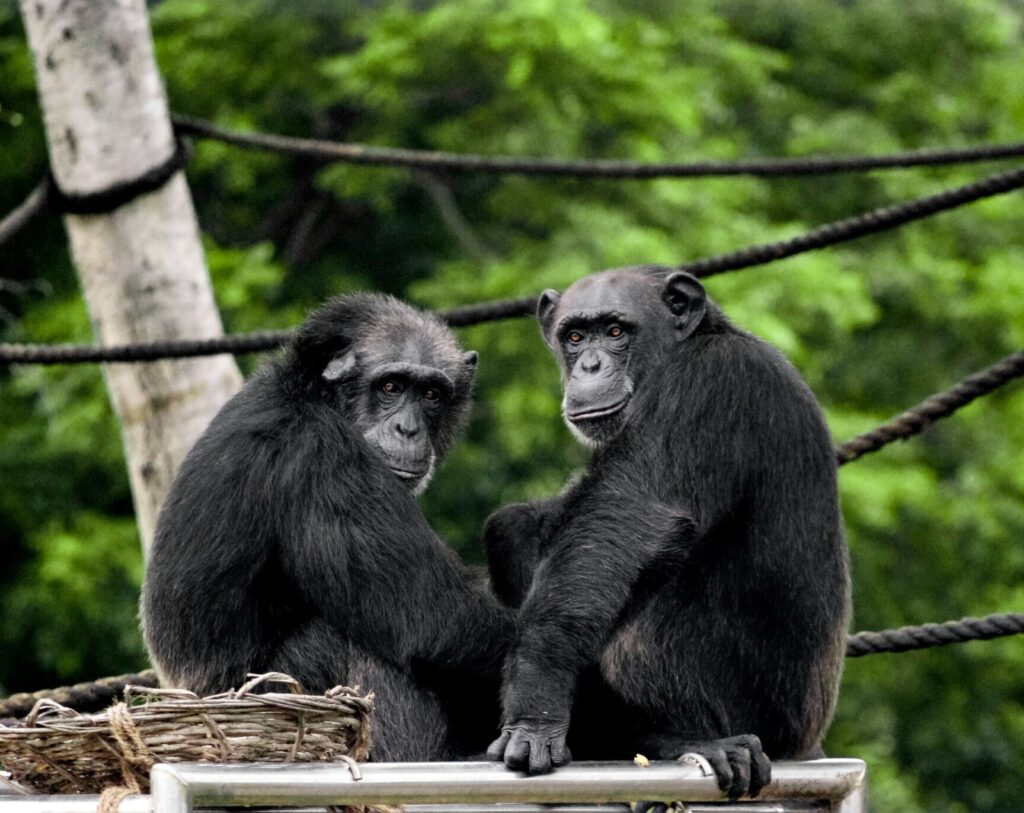
In honor of Jane, of course. Photo by Satya deep on Unsplash
Jane also followed up her words with actions by creating Roots & Shoots, a youth action program that empowers young people to be the change in their communities. It spans more than 140 countries and has projects ranging from recycling drives and community gardens to tree-planting campaigns and animal rescues. Underpinning the youth movement, and Jane’s ethos in general, is that every action matters.
“You cannot get through a single day without having an impact on the world around you,” Jane often reminded her audiences. “What you do makes a difference, and you have to decide what kind of difference you want to make.”
I keep thinking about that quote, and like I wrote about last week, that each of us has influence even if we’re not an influencer. If we accept it as fact that we impact the world every single day, what kind of impact do we want to have? Some people are hellbent on impacting the world negatively by cutting healthcare access, deporting immigrants, or laying off workers so they can further line their own pockets.
In response to those people hellbent on negatively impacting the world, it feels like everyone and their mother is asking, “How are you working to stop them?” I have idiopathic hypersomnia and panic in crowds, so I’m not capable of being in the streets. I can’t join the protests, the marches, the trainings. And I have a loooot of feelings about that. But that doesn’t mean I’m not impacting the world around me. It doesn’t mean I’m not making a contribution.
I’m not a perfect person. I make mistakes. Sometimes I’m the villain in someone else’s story. But more often than not, the contribution I make is one of kindness, empathy, and authenticity. I may not speak in front of millions, but I’ll chat with a friend for an hour so she feels seen and heard. I may not join a protest, but I’ll show up for my friend’s film premiere. Even though those actions are small, they, too, make a difference. And they’re the sort of difference I want to make.
I dream of a world where we all embody the virtues Jane Goodall emphasized as much as we can. A world where we continue to have hope, show compassion, and see every being as worthy of love and respect. A world where we understand every day we make a difference, and we consciously choose what kind of difference we want to make.
Another world is not only possible, it’s probable.
I’m not really sure what to share this week. I’m still in the chrysalis, but/and I can’t force transformation. I can’t be somewhere I’m not and no amount of urging or desire will bring me there. These things unfold in their own time, as much as I wish they followed my timeline instead. What I’m noticing, though, is I’m grateful for co-travelers and so this blog from October 2017 feels appropriate.
What a week. Lots of grief on a societal level, but also a personal one. I’m reminded of how human we are. Of how we’re all in this together. As Ram Dass says, “We’re all just walking each other home.”
In times of trauma and grief, I want to do something. Sometimes there are actions to take, but sometimes all we can do is hold each other while we cry.
With painful feelings, I’ve often wanted someone else to take them away. To siphon them off like sucking water through a straw. I wanted someone, anyone, to make me feel better. Speaking as someone with loads of experience trying to escape her feelings, I can say without a doubt the answer is, “That’s not possible.” No one else can cry my tears for me. No one else can take away my pain. Other people and things may distract me for a while, but just as with storm clouds, they darken the sky whether I acknowledge them or not.
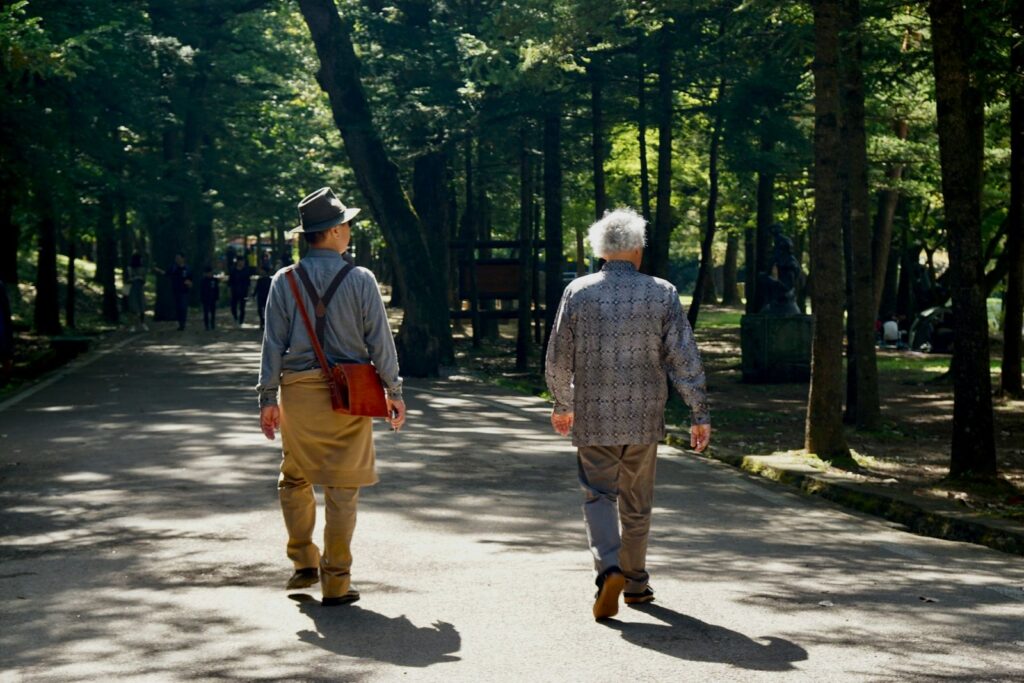
I hope you always have a walking companion. Photo by Beth Macdonald on Unsplash
Ram Dass’ quote reminds me that no one is supposed to take away my pain and sorrow because we are all humans. We are not machines. We can’t write a code that says, “We will never feel sad ever again.” Furthermore, it’s no one’s responsibility to make me feel better. We are fellow companions on this path. We are pilgrims going on a pilgrimage. There may be times I sprain my ankle and have to rely on others for help, but the responsibility for forward motion is still mine, and the responsibility to move through my emotions is still mine.
My spiritual teacher says, “[A] true society is like a group of pilgrims who attain a deep psychic affinity while traveling together, which helps them solve all the problems in their individual and social lives.”
That’s us. A group of pilgrims traveling this rocky path together. I’m speaking in metaphors a lot in this post, but what I’m trying to get at is it’s not my responsibility to solve or fix someone’s emotional state, or vice versa. I don’t have all the answers, or any of the answers, really. I can’t tell a person how to live their life or what they should do to feel better. All I can do is say, “I hear you and I’m beside you. I’m walking this path with you as a companion.” And that’s it. We’ll address problems as they arise – blisters, sprained ankles, etc. – but the emotional states? I’ll be with you during them, but the tears are still yours to cry and the steps are still yours to walk. And maybe that’s enough.
I dream of a world where we recognize we are all pilgrims on a pilgrimage. A world where we sit with each other when we’re in pain. A world where we realize all we can do is be there for each other. A world where we remember we’re all just walking together.
Another world is not only possible, it’s probable.
It’s been truly strange around my neighborhood for the last few days, and I’m not reacting the way I thought I’d react – or the way other people are predicting I’d react. On Thursday, my friend Michael was standing in the doorway and said, “Do you know that guy?” A young man was hopping the fence that separates my apartment complex from my neighbors. I didn’t know him. Michael confronted him as he hopped the fence on the other side.
A few minutes later, police officers drove down the street, and Michael notified them about the trespasser. I thought that would be the end of it, but it wasn’t. The police officers kept coming. And so did two helicopters. And then U.S. marshals. Around 40 police officers and U.S. marshals blocked my street and patrolled with assault rifles drawn. I went grocery shopping in the middle of this and they wouldn’t let me walk back to my apartment without a police escort. Some of my neighbors weren’t allowed in their homes while the officers looked for the guy who hopped the fence.
I read in a news article later that the guy who jumped my fence was armed and the U.S. marshals were looking for him along with two others who were involved in a robbery. One of the culprits violated his patrol. This search and lockdown continued for hours. The two helicopters circled right above me for three hours straight. Police officers literally blocked my driveway.
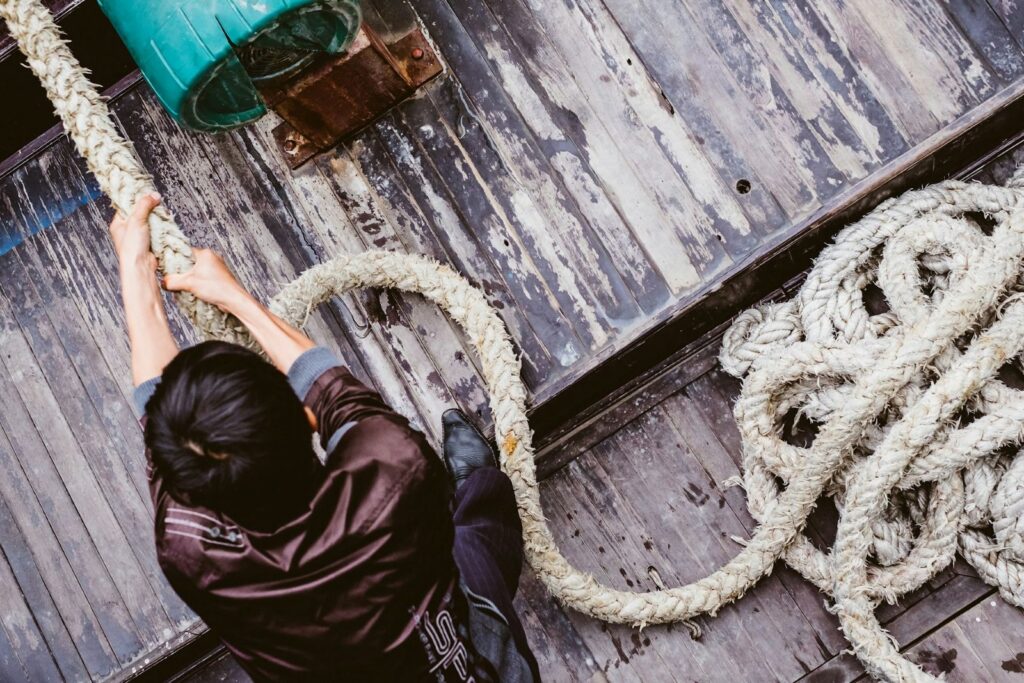
You can do it! Photo by Stijn Swinnen on Unsplash
When I tell most people the events from Thursday, they respond with, “Wow. That’s so scary.” But here’s the thing: I didn’t feel scared. Even though I saw the person they were after. Even though there were guns drawn. I was annoyed. My nerves were frayed from the constant noise and stimulation. But I wasn’t scared.
Then on Saturday, I was without power for 11 hours. I knew it was coming – the electricity company needed to work on a utility pole. Friends remarked how annoying that would be, how unsettling. But I didn’t really mind. It was quiet. I couldn’t even hear the hum of a refrigerator. And it wasn’t so bad because I have a gas stove and could still make myself food. Plus, I just returned from traveling so my tablet was filled with downloaded movies and TV shows. It was fine. I was fine.
My reactions remind me of a quote by A.A. Milne, author of the Winnie-the-Pooh series, who said, “You are braver than you believe, stronger than you seem, smarter than you think, and loved more than you know.” I am strong, and brave, and resilient. I don’t operate with the same amount of fear anymore – even in situations where people expect me to be afraid, I’m not.
Essentially, I’m stepping into my power. I’m owning what I’m capable of as I am, right now. Not the me of 10 years ago. Not the me people think I should be, but the me of here, and now. The me who meets challenges over and over again. The me that says, “I’m scared but I’m still facing this.” I know that’s not true for everyone but even still, maybe you are braver than you believe, stronger than you seem, smarter than you think, and loved more than you know.
I dream of a world where we see ourselves clearly. A world where we stop selling ourselves short. A world where we understand we are capable of so much more than we give ourselves credit for. A world where we take care of ourselves over and over again and realize that’s exactly what we’re doing.
Another world is not only possible, it’s probable.
I’m currently traveling and never have I identified more with the Charles Dickens line, “It was the best of times, it was the worst of times.” The lows are low (no clean clothes for 48 hours! Diverted plane! An unexpected six-hour bus ride!) but the highs are also high. I’m meeting my friends’ children for the first time. I’m reuniting with people I haven’t seen in two years, 10 years. And I’m trying to do as Joseph Campbell advises when he says, “We cannot cure the world of sorrows, but we can choose to live in joy.”
I know there are terrible things happening. I know the world can be so horrible it will break your heart over and over again. I know people are struggling (myself included) but I am choosing to live in joy. And more than that, I’m choosing to relish the little joys when they arrive. Here’s a little story about that.
In early July, I was at a yoga and meditation retreat in upstate New York. It was so sweet to see my spiritual family and connect with people I hadn’t seen in ages. But it was also hard physically – no air-conditioning in the dorms, people walking on creaky wooden floors at all hours of the day and night, and just generally sleeping poorly in a new place. My body was wrecked.
After the retreat, I met my fourth cousin for the first time, who graciously let me stay in his two-bedroom, two-bath apartment near Times Square. Air-conditioning! A comfy bed! No creaky floors! A pool! It was exactly what I needed. The joy of temperature control after sweating all night cannot be overstated. But even still, I was tired, cranky, and feeling off because for the first time in a week, I was completely alone. As I brushed my teeth in my cousin’s bathroom, I looked down and saw a rainbow stripe in the sink.
Many people know that I have a thing about hearts and the word “love.” I see either or both every single day. I share many of those images on Instagram. What’s less known is I also have a thing about rainbows. Whenever I see a rainbow, I will squeal in delight or, at the very least, smile. Rainbows bring me joy in a way that hearts do not because they’re unexpected and rare. It’s easy to spot a heart every day if you look for one because people wear heart necklaces. They carve them into cement. They decorate their homes with love paraphernalia. Hearts are everywhere. Rainbows are not.
When I see a rainbow, it’s like the universe is saying to me, “Hey! Remember the good stuff, kiddo! Relish the joy and remember it can come out of the blue!” When so much of the world feels like a dumpster fire, it feels important to remember that. It relates to a concept my spiritual teacher touts, which is, “Here in the universe, nothing is stationary, nothing is fixed. Everything moves; that’s why this universe is called jagat. Movement is its dharma; movement is its innate characteristic.”
Movement is the innate characteristic of the universe. Nothing is stagnant or static or stale. The world will always be full of sorrows but it will also be full of joys. Am I relishing them when they come? It’s definitely a practice but I’m doing my best because joy is a lot more, well, enjoyable.
I dream of a world where we understand there are always bad things happening but there are also always good things happening. A world where we understand joy is often about the little things – air-conditioning on a hot summer’s day, going to the pool with friends, seeing a rainbow in an unexpected place. A world where we do our best to relish those little joys because we know they aren’t so little after all.
Another world is not only possible, it’s probable.
Many years ago, I had a conversation with one of my closest friends about enlightenment. We compared our approaches – how I live in idealism, fantasy, and move toward the light. He told me his approach is more like crawling down the back of a scaly beast until he comes full circle at its snout. I heard what he said but I didn’t understand it because who wants to go down the scaly back of a beast? Who wants to peer into the seedy underbelly?
It turns out that I do. I’m currently experiencing the astrological transits associated with the mid-life crisis (and if you were born in 1984 or 1985, you are too). If you’re interested, that’s Pluto square Pluto, and essentially it means looking at the shadow and everything that remained hidden. It’s doing what Carl Jung suggested when he said, “One does not become enlightened by imagining figures of light, but by making the darkness conscious.”
I’m realizing how true that is. In my post from the other week about meeting the self, I talked about the importance of looking in the mirror, and sometimes, when you look in the mirror, you don’t like what you see. Some people become well-practiced at avoiding the mirror. It’s too scary, it’s too threatening to witness the parts they want to hide but that’s not me. I’m devoted to myself and that means all parts of myself.
As if to underscore this point, I pulled an oracle card called “Diving for Light.” The author Alana Fairchild says, “It can be so much simpler to seek light in the heavenly, in that which is blissful, sweet, loving, and kind. To look for the light in that which is dark is an advanced task that only a rebellious and brave heart will attempt. You may not feel that you have taken such a journey by choice. Yet you have taken this wise challenge from deep within your soul. Your innermost being has evoked this situation in your life with the intention that you grow in power, wisdom, and creative juice. It also wants you to experience a bold and fearless trust in life and become further empowered to live it with zest and courage.”
That’s true. I want to live fully. I want to liberate myself through expansion, and that means every situation, every struggle, every everything is an opportunity to move closer to the Divine Beloved or further away. My spiritual teacher says our path is an all-around fight, both internally and externally. That means facing my fears, protesting injustice, and always asking, “How can I use this situation or experience to grow?” It’s not only the happy, joyful situations. It’s also the ones that have me crying every single day.
I’m diving for the light by mining the darkness. I’m sifting through the muck looking for gold, not because I particularly want to, but because I recognize there’s something of value in doing so. On the other end of this is more power, more wisdom, more creativity, and being one step closer to enlightenment.
I dream of a world where we understand to become enlightened, we must make the darkness conscious. A world where we use everything as an opportunity to move closer to the Divine Beloved. A world where we dive for the light because we understand that something powerful and transformative is waiting for us in the shadows.
Another world is not only possible, it’s probable.
